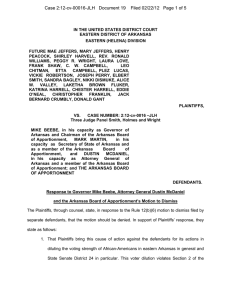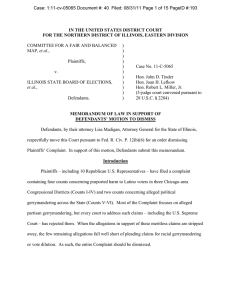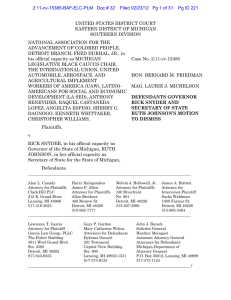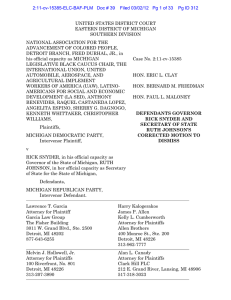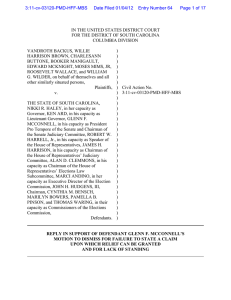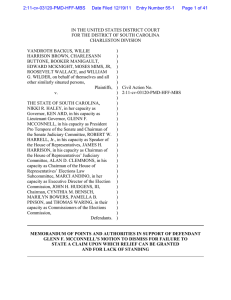IN THE UNITED STATES DISTRICT COURT DALLAS DIVISION
advertisement
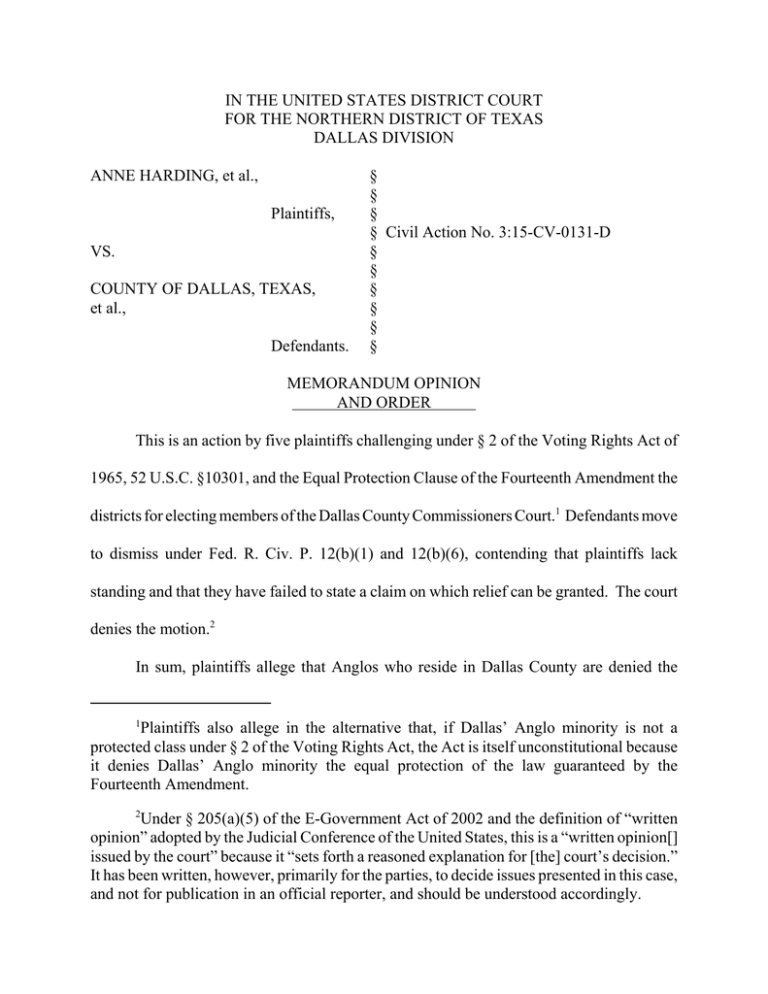
IN THE UNITED STATES DISTRICT COURT FOR THE NORTHERN DISTRICT OF TEXAS DALLAS DIVISION ANNE HARDING, et al., Plaintiffs, VS. COUNTY OF DALLAS, TEXAS, et al., Defendants. § § § § Civil Action No. 3:15-CV-0131-D § § § § § § MEMORANDUM OPINION AND ORDER This is an action by five plaintiffs challenging under § 2 of the Voting Rights Act of 1965, 52 U.S.C. §10301, and the Equal Protection Clause of the Fourteenth Amendment the districts for electing members of the Dallas County Commissioners Court.1 Defendants move to dismiss under Fed. R. Civ. P. 12(b)(1) and 12(b)(6), contending that plaintiffs lack standing and that they have failed to state a claim on which relief can be granted. The court denies the motion.2 In sum, plaintiffs allege that Anglos who reside in Dallas County are denied the 1 Plaintiffs also allege in the alternative that, if Dallas’ Anglo minority is not a protected class under § 2 of the Voting Rights Act, the Act is itself unconstitutional because it denies Dallas’ Anglo minority the equal protection of the law guaranteed by the Fourteenth Amendment. 2 Under § 205(a)(5) of the E-Government Act of 2002 and the definition of “written opinion” adopted by the Judicial Conference of the United States, this is a “written opinion[] issued by the court” because it “sets forth a reasoned explanation for [the] court’s decision.” It has been written, however, primarily for the parties, to decide issues presented in this case, and not for publication in an official reporter, and should be understood accordingly. opportunity to elect candidates of their choice to the Commissioners Court by being packed into one Commissioner district and isolated (fragmented) among the other three Commissioner districts. Plaintiffs maintain that, although Anglos compose 48% of the citizen voting age population, they are able to elect only 25% of the Commissioners (one in four Commissioners) because some Anglos are isolated in Commissioner Districts 1, 3, and 4, with no opportunity to elect their preferred candidates, and other Anglos are packed into Commissioner District 2, where their votes are unnecessarily wasted. Defendants appear to challenge plaintiffs’ standing on the basis that plaintiffs have failed to allege legally cognizable harm. Defendants maintain that plaintiffs do not allege that any individually named plaintiff was prohibited from exercising an individual right to vote or suffered any personalized injury in this respect, and that plaintiffs are purportedly bringing this action on behalf of the Anglo “minority” community as a whole. The court disagrees. The amended complaint identifies each plaintiff’s district of residence and complains about the surfeit (in Commissioner District 2) or fragmentation (in Commissioner Districts 1, 3, and 4) of Anglos and its affect on the voting rights of Anglos in the districts. It is reasonable to infer from the allegations of the amended complaint as a whole that each plaintiff has suffered personalized injury. Nor should this action be dismissed on the pleadings alone at the Rule 12(b)(6) stage. Without suggesting a view on the ultimate merits of this case—which obviously will turn on the evidence introduced at trial if not discovery presented in support of a pretrial -2- motion3—the court concludes that plaintiffs have done enough to plead plausible claims under the Voting Rights Act and the Equal Protection Clause. And it is worth noting that, although Rule 12(b)(6) dismissals are certainly possible in voting rights cases,4 the typical case (like this one) is permitted to move past the pleadings stage to an exploration of the merits. Defendants’ April 16, 2015 first amended motion to dismiss is denied. SO ORDERED. May 28, 2015. _________________________________ SIDNEY A. FITZWATER UNITED STATES DISTRICT JUDGE 3 The court suggests no view regarding whether this case should be resolved by summary judgment motion. For example, in Benavidez v. Irving Independent School District the court in its discretion declined to decide a motion for partial summary judgment in a § 2 lawsuit after determining that the motion presented questions better decided in the context of a trial, which the court itself would conduct as trier of fact. Benavidez v. Irving Indep. Sch. Dist., No. 3:13-CV-0087-D, order at 1 (N.D. Tex. June 3, 2014) (Fitzwater, C.J.). 4 See, e.g., Brown v. City of Shreveport, 158 F.3d 583, 1998 WL 648472, at *1 (5th Cir. Aug. 31, 1998) (per curiam) (unpublished opinion) (affirming dismissal of Voting Rights Act claim under Rule 12(b)(6)). -3-
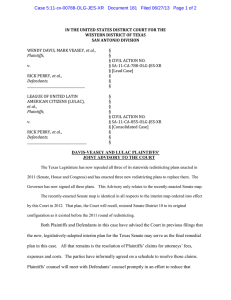
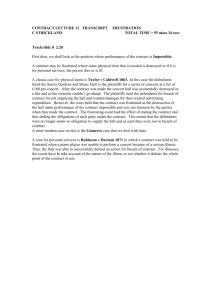
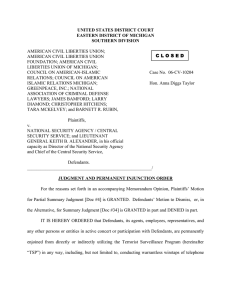
![[Click and Enter Attorney Name], State Bar No - E](http://s3.studylib.net/store/data/007177564_1-4d9407aff5e1ecb2a5922cd955484ee2-300x300.png)

